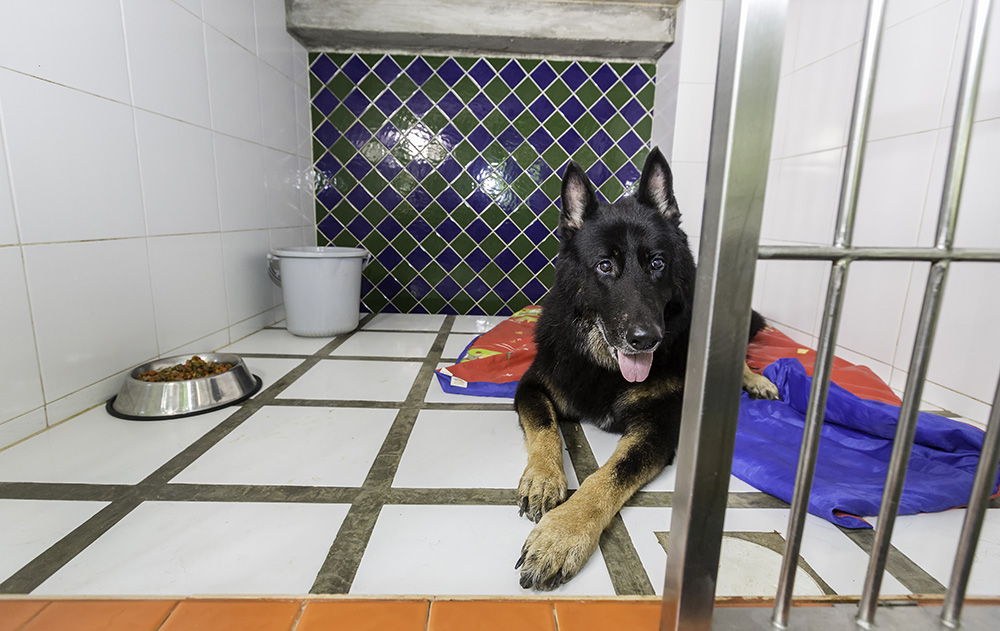Pets dying in boarding facilities are rare, but it’s unfortunate that it can happen. Thoroughly researching reputable dog boarding facilities and leaving detailed care instructions can significantly reduce the risk of pet deaths.
If your dog happens to die while at a boarding facility, the cause of death may help determine who, if anyone, may be at fault. Your veterinarian may be able to provide helpful information on your dog’s cause of death, which can help you build your case. If you have a viable case, you can consider proceeding with filing a lawsuit against the boarding facility. However, know that many times, no cause is determined, and no fault can be assigned. Here’s what you can expect if your dog dies while being boarded and you decide to take legal action against a dog boarding facility.

Here’s What to Do
A dog dying while in a boarding facility is often a rare but challenging and emotionally heavy experience. Not every dog owner ends up deciding to go through with the process of taking legal action against the boarding facility, provided that they are at fault. So, make sure you think thoroughly about taking this route rather than acting out of impulse. Here are some of the steps you can take if you plan to sue.
1. Request a Necropsy

A necropsy is a post-mortem (after-death) examination done by a veterinarian to attempt to determine a cause of death, states Dr. Lauren Demos, MRCVS. Necropsies, however, are not the straightforward practice that TV and movies would necessarily have you believe.
To be most successful, a necropsy needs to be done soon after an animal dies, which is not always the case when a pet is being boarded, says Dr. Demos. Further, even if done in ideal conditions, a necropsy won’t always be able to determine a cause of death, which can be frustrating. Costs can also be prohibitive, as numerous samples are often sent off for histopathology to look for disease at the cellular level.
If you do elect to pursue a necropsy, be prepared for what to expect. A general necropsy procedure also involves a surgical incision that opens both the chest and abdominal cavities of your pet to allow investigation and examination of the internal organs. The extent of this procedure can add further distress to owners who are already suffering from the loss of their beloved pet. However, in some instances, it can be a helpful procedure and potentially offer closure on a pet’s death.
2. Take Care of Your Family Needs First
Make sure to take some time to grieve the loss of your dog. A sudden and unexpected death is a painful experience, and it takes time to process it. States have varying timeframes for statutes of limitations, but you’ll have plenty of time to take care of your family’s needs before the statute of limitations runs out.
Many families grieve the loss of their dogs by holding a memorial for them. You can also find pet burial or cremation services. People often feel more comforted by getting a keepsake that memorializes their dog.
3. Consult an Animal Law Attorney

If the vet determines that your dog died due to something preventable by or negligence from the boarding facility, it’s best to start by consulting an animal law attorney. Animal law attorneys cover a wide range of cases, including animal cruelty, veterinary malpractice, and pet injuries from boarding and grooming services. An animal law attorney can assess the information you have and provide appropriate legal advice. They can also help you determine if it’s worth pursuing a lawsuit.
Reputable dog boarding facilities have dog owners sign waivers, liability forms, or contracts that clearly state their responsibilities. These forms will include an agreement that the facility won’t be held liable if something happens to your dog. An animal law attorney can view these forms and determine if you have a good chance of winning your case.
4. File a Claim
It’s important to note that pursuing a lawsuit against a boarding facility doesn’t typically involve monetary gain. If you do win the case, most states will only require boarding facilities to compensate for the fair market value of your dog. The fair market value is determined with the consideration of varying factors, such as your dog’s pedigree, purchase price, age, and general health.
Sometimes, you may be able to charge a boarding facility for replacement costs. It’s uncommon, but you may also receive compensation for noneconomic damages, which include emotional distress and loss of companionship. However, this only applies to very few states.
Since there isn’t a lot of monetary gain and legal fees often exceed what you’re compensated for, most dog owners file claims against boarding facilities out of principle. It’s more of a means of holding them accountable for wrongdoing.
An animal law attorney can provide information on the initial steps for filing a claim. They can let you know what sort of evidence to gather and help you with any settlement negotiations. They can also advise if punitive damages are applicable to your case. Punitive damages differ from compensation because they’re a form of punishing a facility for wrongdoing. They’re often given on top of compensation when the compensation amount is found to be insufficient and unsatisfactory. Severe cases of negligence or wrongdoing from a dog boarding facility may warrant punitive damages.

Conclusion
Understanding your legal rights can help you know your options and if you can file a claim against a dog boarding facility if your dog dies while under the boarding facility’s care. Make sure to consult a vet to determine your dog’s cause of death and get legal advice from an animal law attorney before filing a claim so that you know what you can expect if you pursue a lawsuit.
There are circumstances where it’s appropriate and viable to file a claim. While you may not be compensated for much, your case may be able to create positive changes to the boarding facility’s business practices and protect other dogs from negligent treatment.
Featured Image Credit: Bussakorn Ewesakul, Shutterstock




















